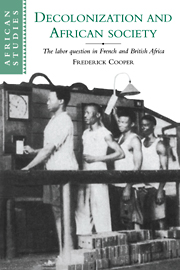Book contents
- Frontmatter
- Contents
- List of tables and figure
- Preface
- List of abbreviations
- Map of French and British colonial Africa
- 1 Introduction
- Part I The dangers of expansion and the dilemmas of reform
- Part II Imperial fantasies and colonial crises
- Part III The imagining of a working class
- Part IV Devolving power and abdicating responsibility
- Introduction
- 10 The burden of declining empire
- 11 Delinking colony and metropole: French Africa in the 1950s
- 12 Nation, international trade unionism, and race: anglophone Africa in the 1950s
- Conclusion: the social meaning of decolonization
- Conclusion
- Notes
- Bibliography
- Index
- OTHER BOOKS IN THE SERIES
Introduction
Published online by Cambridge University Press: 22 February 2010
- Frontmatter
- Contents
- List of tables and figure
- Preface
- List of abbreviations
- Map of French and British colonial Africa
- 1 Introduction
- Part I The dangers of expansion and the dilemmas of reform
- Part II Imperial fantasies and colonial crises
- Part III The imagining of a working class
- Part IV Devolving power and abdicating responsibility
- Introduction
- 10 The burden of declining empire
- 11 Delinking colony and metropole: French Africa in the 1950s
- 12 Nation, international trade unionism, and race: anglophone Africa in the 1950s
- Conclusion: the social meaning of decolonization
- Conclusion
- Notes
- Bibliography
- Index
- OTHER BOOKS IN THE SERIES
Summary
Although no-one knew it at the time, the process of African workers laying claim to the entitlements of French workers had reached its apogee when a series of strike threats culminated in the French administration's promulgation of a system of family allowances in 1956. Already, the labor movement was divided over whether it should pursue its demands for equal pay and equal benefits for all members of the colonial labor force or turn its back on the imperial reference point, putting the labor movement at the service of the drive for political autonomy. The new claims to autonomy flew in the face of everything French officials had advocated since the war, but by the mid-1950s so many claims to French entitlements had been made that officials greeted the new direction in unionism with relief.
In British Africa, the experience of partial self-government in the Gold Coast in the mid-1950s eased the worst fears: the one-time Apostle of Disorder seemed to have become the moderate force officials all along had claimed to want. Nkrumah kept the labor movement in check, preventing it from taking the “communist” direction officials most dreaded. But even this – or the suppression of the Mau Mau revolt – left officials feeling unsure of their capacity to handle social disorder and political challenge or even to follow through on their own initiative to superintend an ambitious program of social and economic development. The early 1950s, to be sure, was a period of economic growth and significant social change, but the modesty of the accomplishments paled beside the magnitude of the task of reconstructing imperial economies and beside the political hope of reconstituting the legitimacy of empire.
- Type
- Chapter
- Information
- Decolonization and African SocietyThe Labor Question in French and British Africa, pp. 389 - 391Publisher: Cambridge University PressPrint publication year: 1996



